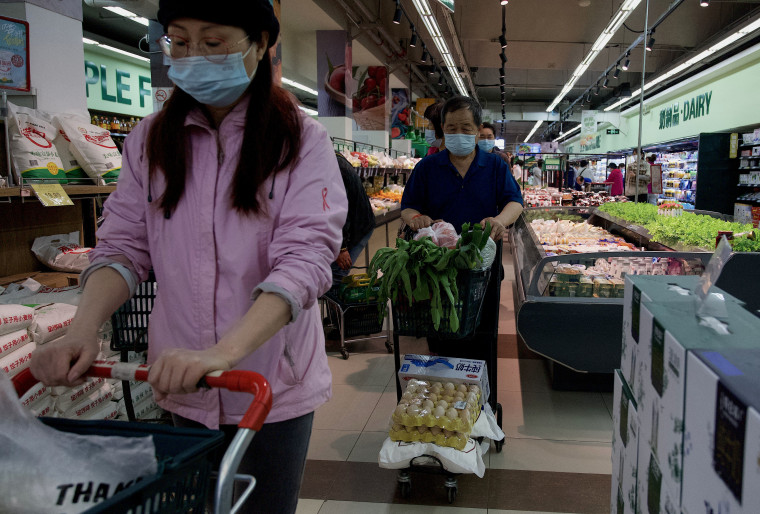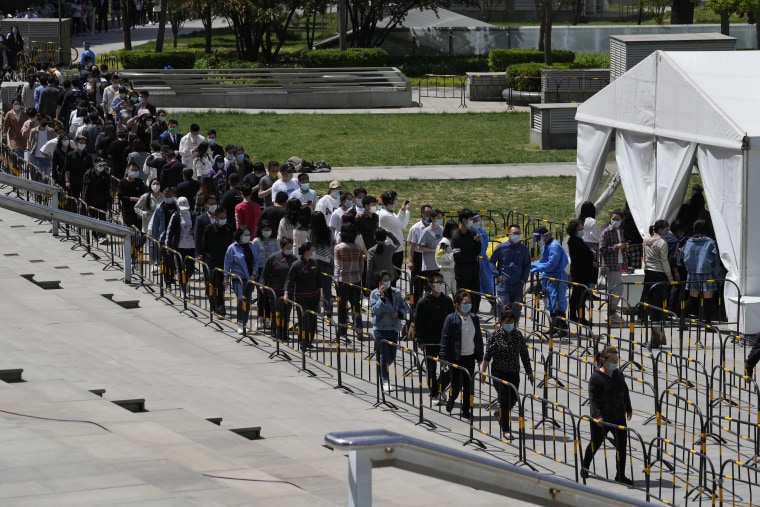BEIJING — A small but growing coronavirus outbreak in Beijing has set off rounds of panic buying as residents fear the Chinese capital will enter a lockdown like the one that has brought life to a standstill for almost a month in Shanghai.
Long lines have formed at Beijing grocery stores as shelves are quickly emptied. Retail and online outlets around the city have extended their opening hours in response to the surge in demand.
“I usually don’t hoard food,” said Sylvia Yin, a 28-year-old psychologist. “This time I went to the supermarket right after work, but food was out of stock: vegetables, fruits, meat, rice, all gone.”
On Monday, the number of orders tripled on the grocery-buying app Meituan Maicai, according to Beijing Daily, a state-run newspaper.
The city of more than 20 million people has reported almost 100 cases since Friday. The local government rushed to seal off residential areas with confirmed cases and ordered three rounds of mass testing this week in 11 out of 16 districts. Activities involving large crowds will be halted and residents are urged to avoid unnecessary travel out of Beijing ahead of a five-day national holiday.

Local officials warned there would be a further increase in cases but called for calm and assured residents there were sufficient food supplies.
Xinfadi, Beijing’s biggest wholesale food market, stocked 19,500 tons of vegetables on Sunday, an increase of about 14 percent compared with a day earlier, Beijing Daily said. The newspaper also reported that Dingdong Maicai, a major online food-purchasing platform, increased its stock in Beijing by five times on Tuesday.
That was not enough to ease the anxiety of some Beijing residents. Amy Chen, a 25-year-old video producer, said she started stockpiling food after Shanghai went into lockdown late last month as part of China’s “zero-Covid” policy of trying to stamp out outbreaks as soon as they arise.
“I had already stored nuts, oil, beef jerky, rice and canned food after Shanghai,” she said. “And I bought some frozen food as people started panic buying in Beijing.”
Attention is shifting to Beijing even as much of Shanghai, China’s largest city and financial center, remains on lockdown. Residents in the city of 26 million have complained of difficulties obtaining food and other daily necessities under strict measures that prevent them from leaving their housing complexes and sometimes even their apartments.
Ned Wang, a 24-year-old designer in Shanghai, said competing with millions of others for online food deliveries now takes up much of his day.
“Often you just grab whatever food is available online,” Wang said. “Meat and fruits have become luxuries.”
Videos circulating online show frustrated Shanghai residents protesting shortages with chants of “We want food” and “We don’t want to starve to death.”
Outbreaks in Shanghai and elsewhere, driven by the highly transmissible omicron variant of the virus, have challenged China’s strict approach to the pandemic, which allowed life in cities like Beijing to remain largely normal in the past two years.

On Tuesday, Shanghai reported almost 17,000 new infections, almost all of them asymptomatic, and 52 new deaths. In Beijing, cases have been found among students, tourists, diners and others who were in crowded places.
Despite sporadic outbreaks, Beijing has not experienced a full lockdown during the pandemic. Hu Xijin, a prominent online commentator and former editor of the state-run Global Times newspaper, said that is unlikely to change.
“If Beijing falls on a large scale, the impact will be unimaginable,” Hu said Monday on Weibo, China’s equivalent of Twitter. “Whether the epidemic can be effectively controlled is not only a test for Beijing, but also a test for the country.”
The city appeared somewhat calmer on Tuesday, and some residents like Xavier Chen, a university teacher, said they saw no need for panic.
“I trust the government’s official announcements and won’t stock up on food out of fear,” said Chen, 32.
His sentiments were echoed by Oleg Fu, a 32-year-old artist.
“I stocked food in previous local Covid outbreaks but didn’t manage to eat everything in the end,” Fu said. “I am not worried at all Beijing will face the same fate as Shanghai.”
Others are preparing for the worst. Pei Chen, a 29-year-old investment manager, said he had bought enough food to last him a month.
“I don’t think Beijing will be locked down, but who knows?” he said. “They also said there wouldn’t be a lockdown in Shanghai.”